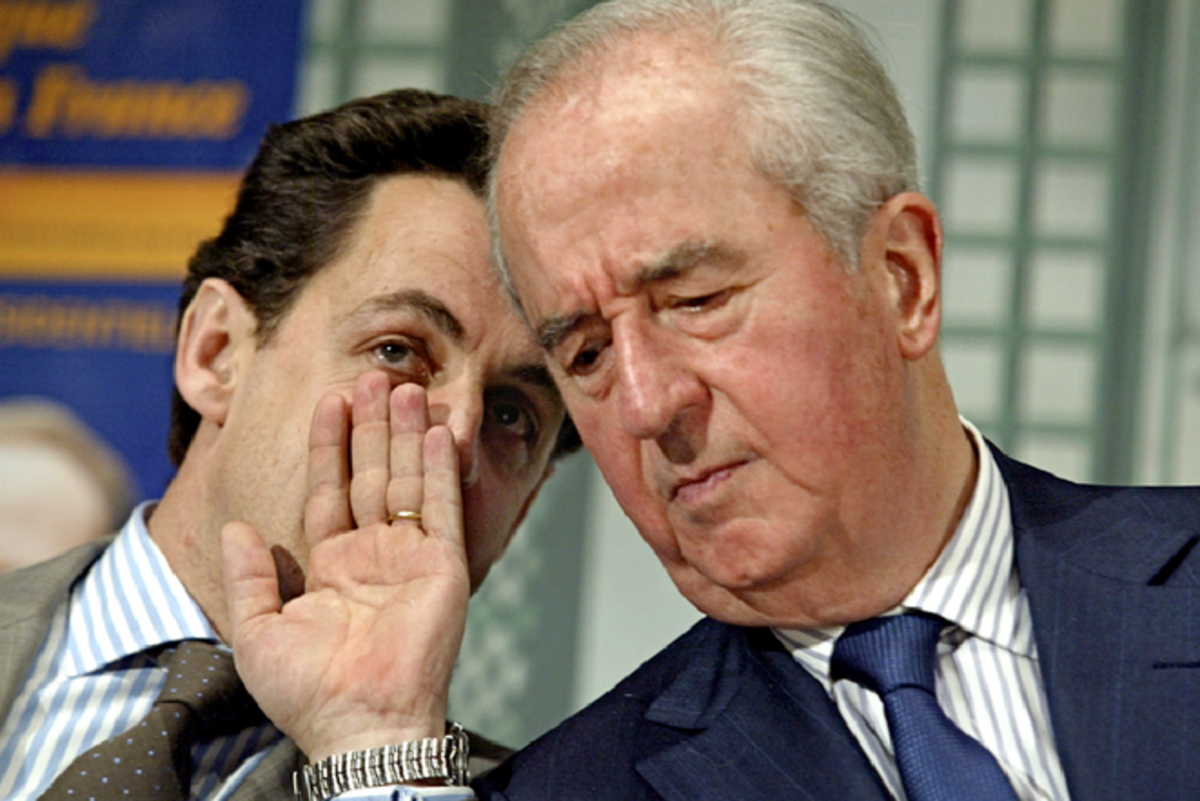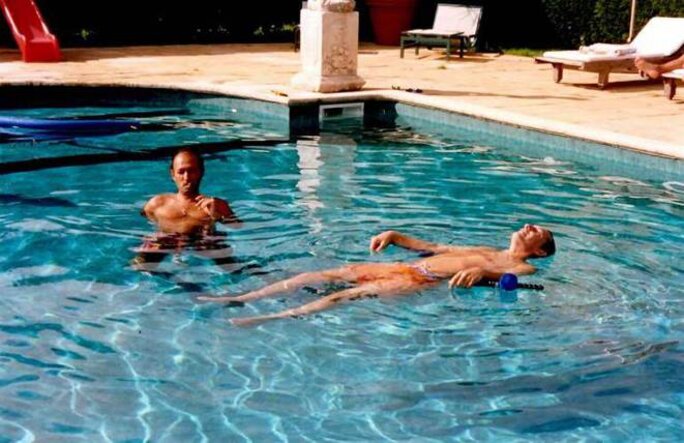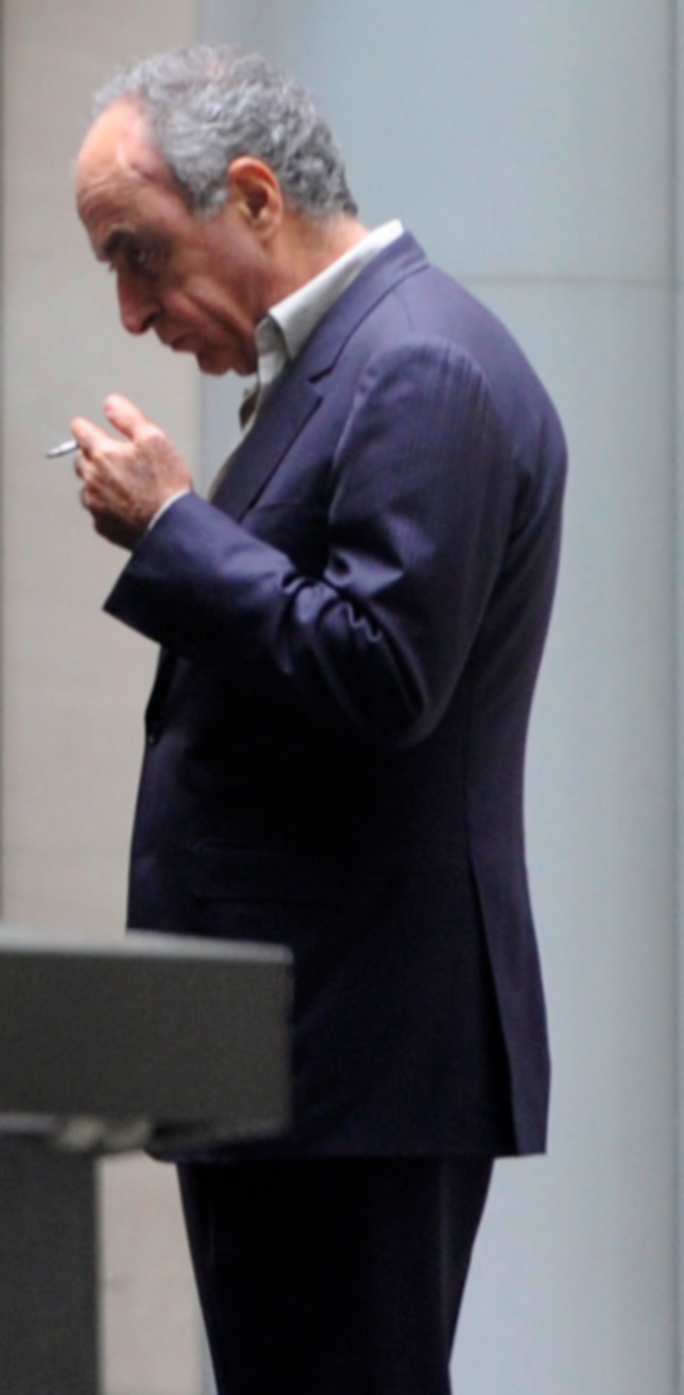An important if not yet decisive step has been taken towards the holding of a trial in France over the so-called Karachi affair. One of the greatest political-financial scandals to hit the country in recent decades, involving claims of corruption, kickbacks from defence contracts and illegal political funding, it has been mired in legal procedural matters since early 2016. But in a document seen by Mediapart, on October 19th a senior prosecutor called for six alleged key figures in the scandal to stand trial.
Among the six are Nicolas Bazire, one-time chief of staff to former right-wing prime minister Édouard Balladur, Renaud Donnedieu de Vabres, ex-special advisor to Balladur's defence minister François Léotard, and Thierry Gaubert, deputy chief of staff to Nicolas Sarkozy when the latter was Balladur's budget minister. They are accused of having organised in advance and/or benefited from an organised system of misappropriation of public money from arms sales signed by Balladur's government with Pakistan and Saudi Arabia between 1993 and 1995.
The other three people whom Advocate General Jean-Paul Gandolière says should stand trial are arms dealers Ziad Takieddine and Abdul Rahman Al Assir plus Dominique Castellan, the former president of the international branch of the naval contractor Direction des constructions navales (DCN), which at the time was owned by the state. The claim is that the arms dealers Al Assir and Takieddine, who were imposed on the arms negotiations at the last minute by the Balladur government, were in a sense the “mules” for the money appropriated as part of a scheme for illegally funding Édouard Balladur's presidential campaign in 1995.

Enlargement : Illustration 1

In fact the six have been sent for trial over the Karachi affair once before. In June 2014, after three-and-a-half years of investigation, the investigating judges Renaud Van Ruymbeke and Roger Le Loire decided that the six should all face court proceedings. But in February 2016 the country's highest appeal court, the Cour de Cassation, raised doubts whether the trial would ever take place by asking the court of appeal in Lyon to re-examine some procedural questions raised by defence lawyers, notably whether some of the alleged offences could not now be tried under the statute of limitations.
The court of appeal in Lyon, in eastern France, will consider those procedural issues on November 3rd and 4th. But in the meantime, and in accordance with standard procedure, prosecutor Jean-Paul Gandolière has sent all the parties his report outlining the prosecution's official views, a copy of which Mediapart has seen. The document is unequivocal: the prosecutor backs the verdict of the original investigating judges and says all six, including the aides to the former ministers, should stand trial over the affair. It is now down to the appeal judges in Lyon to follow or reject (which would be quite unusual) the prosecutor's demands and pave the way, finally, for a trial over events that took place more than 20 years ago.
The basic outline of the story is known. Édouard Balladur was unable to use the resources of the right-wing RPR to back his 1995 campaign as the party was supporting his rival Jacques Chirac. The allegation is that he used his power as prime minister at the time to find the money to fund his political ambitions. This was why, it is claimed, his government began a frenetic campaign to sign arms deal between January and November 1994.

Enlargement : Illustration 2

These were the sale of three Agosta submarines to Pakistan concluded on September 21st 1994; the sale of two frigates to Saudi Arabia, a deal codenamed ‘Sawari 2’ and signed on November 19th 1994; the supply of the armaments for the Saudi frigates, codenamed ‘Shola/Slbs' signed on January 30th 1994, and a contract to re-service frigates sold by France to Saudi Arabia during the 1980s‘, codenamed 'Mouette’ (which also carries the codename of ‘R.O.H.’) and which was also signed on January 30th 1994.
In his role as Balladur's former chief of staff and campaign director Nicolas Bazire, who is today number two at the luxury goods group LVMH, was placed under formal investigation – one step short of charges bring brought – for “misuse of corporate assets” and for “receiving” such assets, as was Renaud Donnedieu de Vabres. Investigators believe they have established that having imposed Ziad Takieddine and his so-called 'K Network' of associates on the French arms deals, the two men had later made use of some of the money paid as kickbacks for political aims.
Who were the organisers of the alleged scam?
Meanwhile Nicolas Sarkozy's former aide Thierry Gaubert was placed under investigation for “receipt of the proceeds of misuse of corporate assets” after investigators showed that he had physically escorted at least 6.2 million francs (about 945,000 euros) in cash from kickbacks from the arms deal commissions.

Enlargement : Illustration 3

Having consistently denied over several years that he was involved in the scam, Ziad Takieddine finally gave a statement to investigating magistrate Van Ruymbeke on June 20th 2013 in which he detailed the first transfer of cash to Gaubert. “In Geneva, I first saw Al Assir who had prepared the money to give to me in 500-franc notes wrapped in a small band,” he declared. “They were in beige manila envelopes, all of which were in a briefcase. Then I went to meet Gaubert in a hotel and I gave him the case. […] For me it was like a request to ‘return a favour’ after having obtained for me the signature of a contract which gave me a lot of money.” The investigation has established that there were to be at least two more such secret cash transfers.
Former DCN-International director Dominique Castellan has been investigated for his role in authorising the exorbitant and unjustified commission payments to Takieddine and Al Assir for the conclusion of a contract for the sale of the three Agosta-class submarines to Pakistan. The judicial investigation obtained considerable evidence, including bank documents and witness testimony, that conclusively established how money from the commission payments was transferred to France via a financial chain that began in secret bank accounts hidden in tax havens behind the names of shell companies.
According to calculations made by Mediapart, a total of 327 million euros had been promised to the Takieddine network and 82.6 million euros were indeed handed over. Of this, the investigation has established that a total of 72,773,000 French francs – equivalent to about 14.6 million euros today after taking inflation into account – were withdrawn in cash by Takieddine and Al Assir from their hidden accounts, mostly in Geneva.
“If, at the time of these events, it was legal to give commissions to agents of influence whose task was to 'corrupt' those close to political decision makers to encourage the signing of arms contracts, the same is not true of unjustified commissions,” noted the Paris public prosecutor’s office in its summing-up report on the case in May 2014.
In fact, the prosecutor’s office believes that the Balladur government’s last-minute move to impose the ‘K Network’ as intermediaries in the arms sales served no business purpose. “The intervention by this network covered by Nicolas Bazire and Renaud Donnedieu de Vabres, acting in the name of their respective [government] administrations, is a veritable imposture which had a significant cost in the end for the French state,” concluded the prosecutor’s office in its May 2014 report.
Even if the six men are finally tried, however, the court case will only involve secondary players in the affair, at least from a political point of view. The real decision makers in the heart of government at the time - Édouard Balladur, François Léotard and, to a lesser extent, Nicolas Sarkozy, are not accountable for their actions in the 'ordinary' justice system. For France still has the Cour de Justice de la République (CJR), a special court whose role is to judge alleged crimes committed by ministers in the course of their government duties. As a presidential candidate François Hollande promised to abolish the court but it still remains in place under his presidency. In June 2014 the CJR said it was investigating the alleged role of Balladur and Léotard in the affair. Both men deny any wrongdoing.
In his official report ahead of the Lyon hearing, prosecutor Jean-Paul Gandolière included a judgement made by the CJR dated September 28th, 2016. This showed that the court waited for two-and-a-half years after the matter was referred to it before it, too, concluded that the alleged offences were not outside the statute of limitations period (apart from a minor part of the case). This would suggest that the actions of the CJR, which is regularly criticised for its lack of dynamism and the softness of its decisions on the rare occasions that a case comes to court, are close to negligible in the Karachi affair.
Meanwhile, anti-terrorist judges continue with a separate investigation into the murders of 11 French engineers while working in Karachi on the construction of the three Agosta-class submarines sold to Pakistan by the Balladur government. They - all employees of the DCN, and four other people - died in a suicide car-bomb attack on their minibus on May 8th 2002. Former anti-terrorism magistrate Marc Trévidic, who was in charge of the case for some time, dismissed initial conclusions that the attack was mounted by an al-Qaida group. Instead he focused upon evidence that the murders were linked to a financial dispute over secret payments in France's weapons sales to Pakistan.
After Jacques Chirac was elected president in 1995, he immediately ended all outstanding payments of arms contract commissions that Balladur's government had put in place, some of which may have been destined for Pakistani officials. One line of enquiry is that the attack, which occurred three days after Chirac was re-elected to a second term as president, was in revenge for the unpaid commissions.
----------------------------------------------------------------------------------
- The French version of this article can be found here.
English version by Michael Streeter


